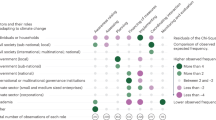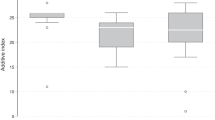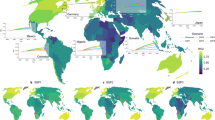Abstract
In the field of adaptation governance research, current discussion on the barriers to adaptation shows that theoretical explanations for why institutions emerge and how they enable or constrain adaptation are underdeveloped. In this Perspective, we show that there is a significant opportunity to advance the understanding of adaptation governance by integrating insights that have been developed in the extensive commons literature on the institutions that work to overcome social conflicts or dilemmas. 'Realist-materialist' approaches to understanding such collective action are particularly valuable to adaptation governance research because they emphasize how biophysical conditions give rise to certain types of social dilemma. Climate change affects these biophysical conditions, and thus may alter dilemmas or create new ones. Based on realist-materialist reasoning, this Perspective describes six types of dilemma, illustrates each with a case from the adaptation literature and draws on insights from the commons literature regarding relevant contextual conditions and effective policy instruments for overcoming social dilemmas. The dilemma types provide entry points for rigorous comparative adaptation research to deepen understanding of how context influences adaptation governance processes.
This is a preview of subscription content, access via your institution
Access options
Subscribe to this journal
Receive 12 print issues and online access
$209.00 per year
only $17.42 per issue
Buy this article
- Purchase on Springer Link
- Instant access to full article PDF
Prices may be subject to local taxes which are calculated during checkout

Similar content being viewed by others
References
Ostrom, E., Gardner, R. & Walker, J. Rules, Games and Common-Pool Resources (Univ. Michigan Press, 1994).
Adger, W. N. Social capital, collective action and adaptation to climate change. Econ. Geogr. 79, 387–404 (2003).
Tomkins, E. & Adger, W. N. Does adaptive management of natural resources enhance resilience to climate change? Ecol. Soc. 9, 10 (2004).
Pelling, M., High, C., Dearing, J. & Smith, D. Shadow spaces for social learning: a relational understanding of adaptive capacity to climate change within organisations. Environ. Plann. A 40, 867–884 (2008).
Hinkel, J. & Bisaro, A. Methodological choices in solution-oriented adaptation research: a diagnostic framework. Reg. Environ. Change http://dx.doi.org/10.1007/s10113-014-0682–0 (2014).
IPCC Summary for Policymakers in Climate Change 2014: Impacts, Adaptation and Vulnerability. (eds Field, C. B. et al.) 1–32 (Cambridge Univ. Press, 2014).
Agrawala, S. Adaptation: Contributing to the common good. Nature Clim. Change 1, 447–448 (2011).
Tompkins, E. L. & Eakin, H. Managing private and public adaptation to climate change. Global Environ. Change 22, 3–11 (2012).
Moser, S. C. & Ekstrom, J. A framework to diagnose barriers to climate change adaptation. Proc. Natl Acad. Sci. USA 107, 22026–22031 (2010).
Gupta, J. et al. in Making Climate Change Work for Us (eds Hulme, M. & Neufeldt, H.) 319–339 (Cambridge Univ. Press, 2009).
Adger, W. N. et al. Are there social limits to adaptation to climate change? Climatic Change 93, 335–354 (2009).
Benzie, M. Social justice and adaptation in the UK. Ecol. Soc. 19, 39 (2014).
Hughes, S. Justice in urban climate change adaptation: criteria and application to Delhi. Ecol. Soc. 18, 48 (2013).
Ostrom, E., Burger, J., Field, C. B., Norgaard, R. B. & Policansky, D. Revisiting the commons: local lessons, global challenges. Science 284, 278–282 (1999).
Folke, C., Hahn, T., Olsson, P. & Norberg, J. Adaptive governance of social-ecological systems. Annu. Rev. Env. Resour. 30, 1–8 (2005).
Ostrom, E. A general framework for analyzing sustainability of social-ecological systems. Science 325, 419–422 (2009).
Ecology and Society Special Feature: The Governance of Adaptation (eds Huitema, D. et al.); http://www.ecologyandsociety.org/issues/view.php?sf=87
Plummer, R. Can adaptive comanagement help to address the challenges of climate change adaptation? Ecol. Soc. 18, 2 (2013).
Munaretto, S., Siciliano, G. & Turvani, M. E. Integrating adaptive governance and participatory multicriteria methods: a framework for climate adaptation governance. Ecol. Soc. 19, 74 (2014).
Dupuis, J. & Knoepfel, P. The adaptation policy paradox: the implementation deficit of policies framed as climate change adaptation. Ecol. Soc. 18, 31 (2013).
Mees, H. L. P. et al. A method for the deliberate and deliberative selection of policy instrument mixes for climate change adaptation. Ecol. Soc. 19, 58 (2014).
Eisenack, K. et al. Explaining and overcoming barriers to climate change adaptation. Nature Clim. Change 4, 867–872 (2014).
Biesbroek, R. et al. Opening up the black box of adaptation decision-making. Nature Clim. Change 5, 493–494 (2015).
Ostrom, E. Governing the Commons: The Evolution of Institutions for Collective Action (Cambridge Univ. Press, 1990).
Wade, R. The management of common property resources: collective action as an alternative to privatisation or state regulation. Camb. J. Econ. 11, 95–106 (1987).
Janssen, M. A., Holahan, R., Lee, A. & Ostrom, E. Lab experiments for the study of social-ecological systems. Science 328, 613–617 (2010).
Ostrom, E. Collective action and the evolution of social norms. J. Econ. Perspect. 3, 137–158 (2000).
Schmidt, V. A. Discursive institutionalism: the explanatory power of ideas and discourse. Polit. Sci. 11, 303 (2008).
Schmid, A. A. Conflict and Cooperation: Institutional and Behavioral Economics (Blackwell, 2004).
Paavola, J. & Adger, W. N. Institutional ecological economics. Ecol. Econ. 53, 353–368 (2005).
Varela-Ortega, C. et al. How can irrigated agriculture adapt to climate change? Insights from the Guadiana basin in Spain. Reg. Environ. Change 16, 59–70 (2014).
Ostrom, E. Understanding Institutional Diversity (Princeton Univ. Press, 2005).
Hagedorn, K., Arzt, K. & Peters, U. in Environmental Co-operation and Institutional Change: Theories and Policies for European Agriculture (ed. Hagedorn, K.) 3–25 (Elgar, 2002).
Bougherara, D., Grolleau, G. & Mzoughi, N. The 'make or buy' decision in private environmental transactions. Eur. J. Law Econ. 27, 79–99 (2009).
Kimmich, C. Linking action situations: coordination, conflicts, and evolution in electricity provision for irrigation in Andhra Pradesh, India. Ecol. Econ. 90, 150–158 (2013).
Ménard, C. Embedding organizational arrangements: towards a general model. J. Institutional Econ. 10, 567–589 (2014).
Ostrom, E. in Community Management and Common Property of Coastal Fisheries in Asia and the Pacific: Concepts, Methods and Experiences (ed. Pomeroy, R.) 34–50 (International Center for Living Aquatic Resources Management, 1994).
Samuelson, P. A. in Public Economics (eds Margolis, J. & Guitton, H.) 98–123 (Macmillan, 1969).
Hinkel, J., Cox, M. E., Schlüter, M., Binder, C. R. & Falk, T. A diagnostic procedure for applying the social-ecological systems framework in diverse cases. Ecol. Soc. 20, 32 (2015).
Huntjens, P. et al. Institutional design propositions for the governance of adaptation to climate change in the water sector. Glob. Environ. Change 22, 67–81 (2012).
Hinkel, J. et al. Coastal flood damage and adaptation costs under 21st century sea-level rise. Proc. Natl Acad. Sci. USA 111, 3292–3297 (2014).
Meinzen-Dick, R., Raju, K. V. & Gulati, A. What affects organization and collective action for managing resources? Evidence from canal irrigation systems in India. World Dev. 30, 649–666 (2002).
Nordhaus, W. D. in Samuelsonian Economics and the Twenty-First Century (eds Szenberg, M., Ramrattan, L. & Gottesman, A.) 88–98 (Oxford Univ. Press, 2005).
Adger, W. N., Lorenzoni, I. & O'Brien, K. L. Adapting to Climate Change: Thresholds, Values, Governance (Cambridge Univ. Press, 2009).
Tainio, A. et al. Conservation of grassland butterflies in Finland under a changing climate. Reg. Environ. Change 16, 71–84 (2014).
Rittel, J. H. W. & Webber, M. M. Dilemmas in a general theory of planning. Policy Sci. 4, 155–169 (1973).
Olson, M. The Logic of Collective Action: Public Goods and the Theory of Groups (Harvard Univ. Press, 1965).
van Slobbe, E., Werners, S. E., Riquelme Solar, M., Bölscher, T. & van Vliet, M. The future of the Rhine: stranded ships and no more salmon? Reg. Environ. Change 16, 31–41 (2014).
Sen, A. K. Isolation, assurance and the social rate of discount. Q. J. Econ. 81, 112–124 (1967).
Blomquist, W. in Rules, Games and Common-Pool Resources (eds Ostrom, E., Gardner, R. & Walker, J.) Ch. 13 (Univ. Michigan Press, 1994).
Runge, C. F. Institutions and the free rider: the assurance problem in collective action. J. Polit. 46, 154–181 (1984).
Kovats, R. S. et al. in Climate Change 2014: Impacts, Adaptation and Vulnerability. Part B: Regional Aspects (eds Barro, V. R. et al.) 1267–1326 (IPCC, Cambridge Univ. Press, 2014).
White, I. The absorbent city: urban form and flood risk management. Proc. ICE - Urban Des. Plan. 161, 151–161 (2008).
Libecap, G. D. Distributional issues in contracting for property rights. J. Institutional Theor. Econ. 1, 6–24 (1989).
Mees, H. L., Driessen, P. P., Runhaar, H. A. & Stamatelos, J. Who governs climate adaptation? Getting green roofs for stormwater retention off the ground. J. Environ. Plan. Manag. 56, 802–825 (2013).
Wong, P. P. et al. Coastal systems and low-lying areas. Climatic Change 6, 361–409 (2014).
Arkema, K. K. et al. Coastal habitats shield people and property from sea-level rise and storms. Nature Clim. Change 3, 913–918 (2013).
Shapiro-Kline, J. The Impact of the Public Process in Rebuild by Design. MSc Thesis, Columbia Univ. (2014).
Beatley, T. Planning for Coastal Resilience: Best Practices for Calamitous Times (Island, 2009).
Howgate, O. R. & Kenyon, W. Community cooperation with natural flood management: a case study in the Scottish Borders. Area 41, 329–340 (2009).
Dombrowsky, I. Conflict, Cooperation, and Institutions in International Water Management: An Economic Analysis (Elgar, 2007).
Füssel, H.-M. & Klein, R. J. T. Climate change vulnerability assessments: an evolution of conceptual thinking. Climatic Change 75, 301–329 (2006).
Haasnoot, M., Middelkoop, H., Offermans, A., van Beek, E. & van Deursen, W. P. A. Exploring pathways for sustainable water management in river deltas in a changing environment. Climatic Change 115, 795–819 (2012).
Kwadijk, J. C. J. et al. Using adaptation tipping points to prepare for climate change and sea level rise: a case study in the Netherlands. WIREs Clim. Change 1, 729–740 (2010).
Schlager, E., Blomquist, W. & Tang, S. Y. Mobile flows, storage, and self-organized institutions for governing common-pool resources. Land Econ. 70, 294–317 (1994).
Agrawal, A. Common property institutions and sustainable governance of resources. World Dev. 29, 1649–1672 (2001).
Berkes, F. Community-based conservation in a globalized world. Proc. Natl Acad. Sci. USA 104, 15188–15193 (2007).
Bisaro, A. Climate Change Adaptation and Wetlands Governance: A Discourse and Institutional Analysis (Shaker, 2015).
Acknowledgements
This work has been supported by the EU-funded projects RISES-AM (grant no. 603396) and GREEN-WIN (grant no. 642018).
Author information
Authors and Affiliations
Contributions
A.B. initiated the planning of the project and conducted systematic literature reviews. Both authors contributed equally to the intellectual content and the drafting, revision and editing of the text.
Corresponding author
Ethics declarations
Competing interests
The authors declare no competing financial interests.
Rights and permissions
About this article
Cite this article
Bisaro, A., Hinkel, J. Governance of social dilemmas in climate change adaptation. Nature Clim Change 6, 354–359 (2016). https://doi.org/10.1038/nclimate2936
Received:
Accepted:
Published:
Issue Date:
DOI: https://doi.org/10.1038/nclimate2936
This article is cited by
-
Exploring spatial feedbacks between adaptation policies and internal migration patterns due to sea-level rise
Nature Communications (2023)
-
Construing Climate Change Adaptation as Global Public Good Under International Law: Problems and Prospects
Liverpool Law Review (2023)
-
Considering socio-political framings when analyzing coastal climate change effects can prevent maldevelopment on small islands
Nature Communications (2021)
-
From incremental to transformative adaptation in individual responses to climate-exacerbated hazards
Nature Climate Change (2020)
-
The effectiveness of setback zones for adapting to sea-level rise in Croatia
Regional Environmental Change (2020)



